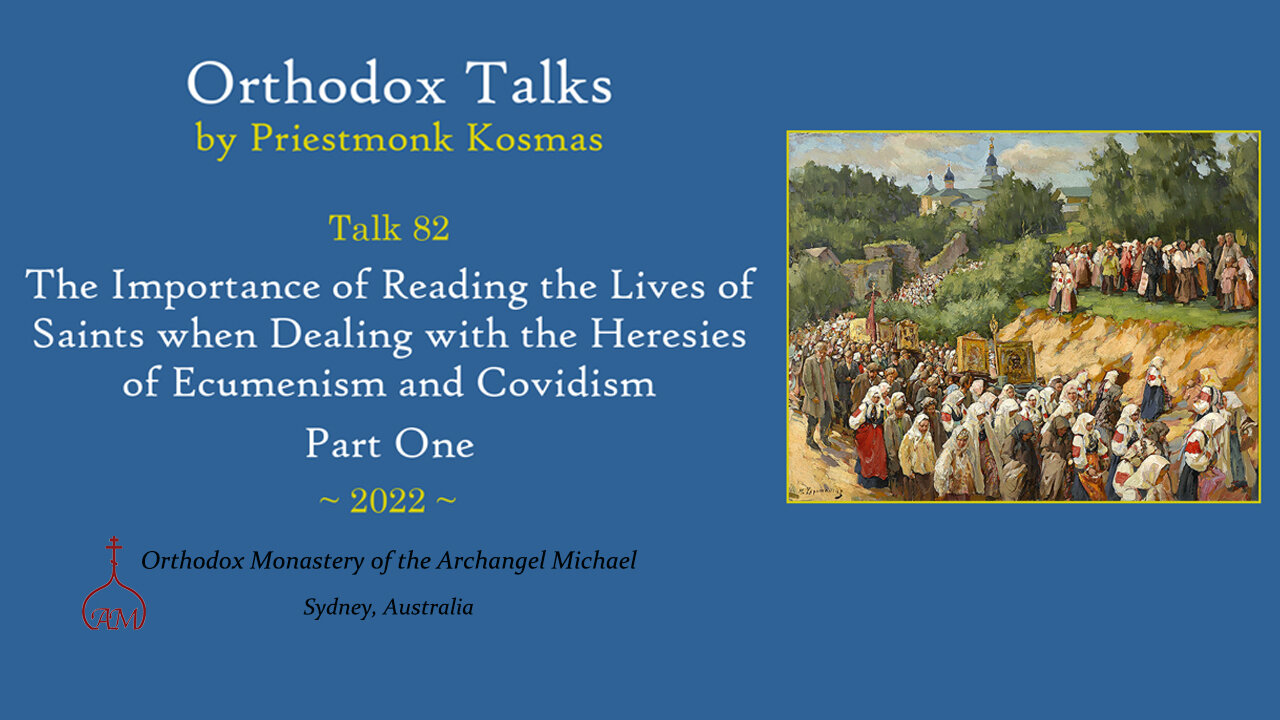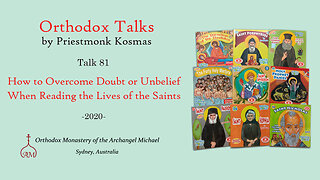Premium Only Content

Talk 82: The Importance of Reading the Lives of Saints when Dealing with Ecumenism & Covidism - 1
Orthodox Talks by Priestmonk Kosmas, Sydney, Australia
www.OrthodoxTalks.com
iTunes: https://podcasts.apple.com/us/podcast/orthodox-talks/id1659252607
Spotify: https://open.spotify.com/show/0sKZoGUhAjJua9RtjoZS73
Podcast: https://rss.com/podcasts/orthodoxtalks/
We read in several lives of the saints that they had to deal with various heresies in their time. Today the Orthodox Church is faced with two heresies: ecumenism and covidism. The heresy of ecumenism has been around for approximately 100 years, while the heresy of covidism began in 2020. Much has been written about ecumenism by our saints and holy elders, and the faithful are thus better equipped to deal with this heresy. Because the heresy of covidism is new, however, many of the faithful were justifiably confused - and even deceived - when it manifested.
What is covidism? It is the heretical belief that one can contract diseases from a place, object or sanctified person in which the grace of God dwells – or more generally, that the grace of God bears no power at all to defend the faithful from sickness, particularly Covid-19.
The covidists used various demonic arguments to justify the horrible practices that they introduced into our churches: forbidding the veneration of the Life-giving Cross, holy relics and icons; not allowing the faithful to partake of holy water, holy unction and holy oil within the church; changing the way Holy Communion is administered; not allowing the faithful to receive the blessing from a priest; the wearing of masks, and the closing of churches. Adding to all this sacrilege and blasphemy, the covidists went so far as to become pro-mass vaccination and to turn some churches into vaccination hubs.
In this talk, Father Kosmas explains that all these restrictions and practices are sacrilegious and blasphemous, and contradict the examples found in the lives of saints and elsewhere in Orthodox tradition. He states that many of the faithful were deceived into believing that all these practices were correct, while others reluctantly accepted them due to fear, weakness or an incorrect understanding of obedience. Father Kosmas also analyses some of the reasons that many Orthodox clergy fell to such a low spiritual level, which eventually led them into the heresy of covidism.
The following questions are also discussed: what is the difference between the terms endemic, epidemic and pandemic? How did the holy Orthodox Church deal with epidemics, pandemics, plagues, cholera, typhus and other deadly infectious diseases in the past? Why did the faithful pray to God about their bishop, saying, “Why, oh Lord, have You sent us such a monster?” How were bishops chosen in the past compared to how they are chosen today? Why did a contemporary elder constantly keep in mind the saying: “Better with a prayer-rope in Paradise than an epitrachelion in hell”? Should the clergy have trusted in the saints, elders and eldresses rather than the medical authorities and pharmaceutical companies? Why did Saints Athanasius the Great and John Chrysostom say that hell is filled with many bishops and priests? What did Abba Pambo prophesy regarding the clergy of the last times? What did Saint John of San Francisco and Saint Nicholas Planas say about those who believe one can get sick from Holy Communion? What happened to the clergy and laypeople that communed from the same chalice that a COVID-infected Bishop communed from first? What did some contemporary saints say about being blindly obedient to bishops and priests? Why did Blessed Father Kosmas of Grigoriou say that it would be better to study in a monastery than in a seminary?
Other points covered in this talk include: how some clergymen secretly stood up and ignored the demonic orders of their bishops and their governments; an account of a Russian bishop in 1909 who refused to conduct the Great Blessing of the Waters over steaming pots; how only a very few Orthodox Christians openly refused to go along with the obvious attack on the Orthodox Church, calling out their bishops and priests; why so many Orthodox clergymen fell into the sin of compromise and others into the sin of betrayal, especially during lockdown; the meaning of “silence equates to consent,” and “The silence of the clergy is atheism”; the unexplainable phenomenon that occurred in a parish church at the site of the Chernobyl nuclear disaster; some wonderful examples of how the saints helped during times of serious contagious diseases; why Saint Haralambos is the most venerated saint on Mount Athos, after the Mother of God; why Protestants and Catholics in Zaire were jealous of the Orthodox during a serious epidemic of cholera; the direct relationship between heresy and disasters; and what Metropolitan Augoustinos of Florina and Father George Calciu said about themselves after studying theology.
-
 4:44:34
4:44:34
Orthodox Talks
1 year agoTalk 81: How to Overcome Doubt or Unbelief When Reading the Lives of the Saints
1.83K -
 9:34
9:34
Dr David Jockers
14 hours ago $5.69 earnedThe Shocking Truth About Butter
63.1K1 -
 9:05
9:05
Bearing
21 hours agoJaguar's Woke New Ad is SHOCKINGLY Bad 😬
13.1K60 -
 7:55
7:55
Chris From The 740
13 hours ago $5.09 earnedWill The AK Project Function - Let's Head To The Range And Find Out
9.86K7 -
 2:39
2:39
BIG NEM
10 hours agoHygiene HORROR: The "Yurt Incident"
6.2K1 -
 3:19:21
3:19:21
Price of Reason
13 hours agoHollywood Celebrities FLEE the US After Trump Win! Wicked Movie Review! Gaming Journos MAD at Elon!
74K40 -
 3:55:45
3:55:45
Alex Zedra
8 hours agoLIVE! Last Map on The Escape: SCARY GAME.
72.2K3 -
 1:14:07
1:14:07
Glenn Greenwald
13 hours agoComedian Dave Smith On Trump's Picks, Israel, Ukraine, and More | SYSTEM UPDATE #370
170K216 -
 1:09:07
1:09:07
Donald Trump Jr.
16 hours agoBreaking News on Latest Cabinet Picks, Plus Behind the Scenes at SpaceX & Darren Beattie Joins | TRIGGERED Ep.193
208K714 -
 1:42:43
1:42:43
Roseanne Barr
11 hours ago $62.84 earnedGod Won, F*ck You | The Roseanne Barr Podcast #75
92.5K193